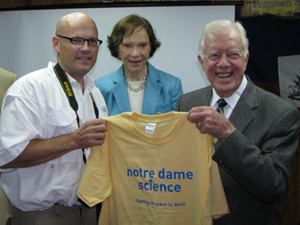
Gregory Crawford, dean of the University of Notre Dame’s College of Science, and Rev. Thomas Streit, C.S.C., founder of the University’s Haiti Program, met with former U.S. President Jimmy Carter and Mrs. Carter on Thursday (0ct. 8) in the offices of the minister of health for Haiti.
The meeting came in conjunction with the former president’s visit to Haiti and the Dominican Republic to urge political leaders in both countries to work together to rid Hispaniola, the island they both share, of both malaria and lymphatic filariasis (also known as elephantiasis or LF).
Crawford and Father Streit discussed Notre Dame’s initiatives in Haiti with the Carters. Through two primary grants from the Bill and Melinda Gates Foundation, the Centers for Disease Control and Prevention and other partners including the Sabin Institute’s Global Network for Neglected Tropical Diseases and IMA World Health, Notre Dame has had a leading role in the battle against LF over the last 17 years.
In Haiti, the partners plan to eliminate LF by 2016, but worldwide there are more than 1.2 billion people threatened by LF, one of seven neglected tropical diseases. LF affects 120 million people in 83 countries, including Brazil, India and much of central Africa.
Caused by thread-like parasitic worms that attack the lymphatic system, LF is usually contracted during childhood, often before age 5, but the disease manifests itself in adulthood. More than 40 million people, the poorest of the poor, are seriously debilitated by the swelling of the limbs, breast and genitals caused by LF.
Next to mental illness, LF is the leading cause of disability in the world.
The Notre Dame Haiti Program is a world leader in the fight against LF. With a concentrated effort at eliminating the disease in Haiti, where more than 10 percent of the national population is infected (and as much as 50 percent in some regions), Notre Dame and its partners are steadily moving toward critical research on the impact of elimination efforts that will have great significance for the worldwide elimination of LF.